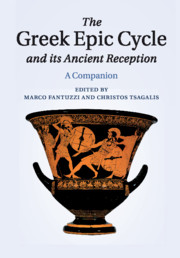Book contents
- Frontmatter
- Contents
- List of illustrations
- List of contributors
- Editorial note
- Introduction: Kyklos, the Epic Cycle and Cyclic poetry
- PART I APPROACHES TO THE EPIC CYCLE
- 1 Coming adrift: The limits of reconstruction of the cyclic poems
- 2 Oral traditions, written texts, and questions of authorship
- 3 The Epic Cycle and oral tradition
- 4 The formation of the Epic Cycle
- 5 Motif and source research: Neoanalysis, Homer, and Cyclic epic
- 6 Meta-Cyclic epic and Homeric poetry
- 7 Language and meter of the Epic Cycle
- 8 Narrative techniques in the Epic Cycle
- 9 Wit and irony in the Epic Cycle
- 10 The Trojan War in early Greek art
- PART II EPICS
- PART III THE FORTUNE OF THE EPIC CYCLE IN THE ANCIENT WORLD
- Works cited
- Index of principal passages
- Index nominum et rerum
1 - Coming adrift: The limits of reconstruction of the cyclic poems
from PART I - APPROACHES TO THE EPIC CYCLE
Published online by Cambridge University Press: 05 August 2015
- Frontmatter
- Contents
- List of illustrations
- List of contributors
- Editorial note
- Introduction: Kyklos, the Epic Cycle and Cyclic poetry
- PART I APPROACHES TO THE EPIC CYCLE
- 1 Coming adrift: The limits of reconstruction of the cyclic poems
- 2 Oral traditions, written texts, and questions of authorship
- 3 The Epic Cycle and oral tradition
- 4 The formation of the Epic Cycle
- 5 Motif and source research: Neoanalysis, Homer, and Cyclic epic
- 6 Meta-Cyclic epic and Homeric poetry
- 7 Language and meter of the Epic Cycle
- 8 Narrative techniques in the Epic Cycle
- 9 Wit and irony in the Epic Cycle
- 10 The Trojan War in early Greek art
- PART II EPICS
- PART III THE FORTUNE OF THE EPIC CYCLE IN THE ANCIENT WORLD
- Works cited
- Index of principal passages
- Index nominum et rerum
Summary
What is the ‘Epic Cycle’? The Greek is epikos kyklos, which literally means ‘epic circle’. Kyklos in its most primary meaning refers to an object of circular dimensions (e.g. wheel, shield), but it could also be applied metaphorically to a compilation of literary material. The ‘Epic Cycle’, simply put, is a collection of epic verse. Unfortunately the Epic Cycle is now lost, except for various kinds of fragments, testimony and summaries. Our challenge is to sort through this evidence and reconstruct the Epic Cycle as best we can. Many learned and rewarding attempts to do so can be found in this Companion. But all attempts, not least my own, ultimately result from guesswork that depends on arbitrary assumptions.
Models of reconstruction
The Epic Cycle included theogonic beginnings and the heroic wars at Thebes and Troy. The Trojan War and its aftermath have attracted the most attention, both in antiquity and in the modern world, because of its relevance to the Homeric poems. Indeed the Epic Cycle's useful contextualization of the Iliad and the Odyssey has led to the common conception of it as something secondary to ‘Homer’, both in chronology and value. For hermeneutic purposes I will call this the ‘Homer-centric’ model, which has been dominant from antiquity onward. In its starkest form, this model posits that a series of poems were composed on the basis of the Homeric poems, though falling far short of their poetics, in order to surround them with prequels and sequels. A different model, which I will label ‘Systemic,’ would link the Epic Cycle broadly with various material about the Trojan War in ancient literary and artistic traditions. In its starkest form, this model suggests that the Cycle poems represent mythological and epic traditions that were earlier than the Homeric poems. Adherents to both models have dedicated themselves to the scholarly sleuthing required to make sense out of the scanty evidence. But these two models vary widely on their conception of how the Epic Cycle relates to the Homeric poems and what role they generally played in early epic.
- Type
- Chapter
- Information
- The Greek Epic Cycle and its Ancient ReceptionA Companion, pp. 43 - 58Publisher: Cambridge University PressPrint publication year: 2015
- 14
- Cited by



